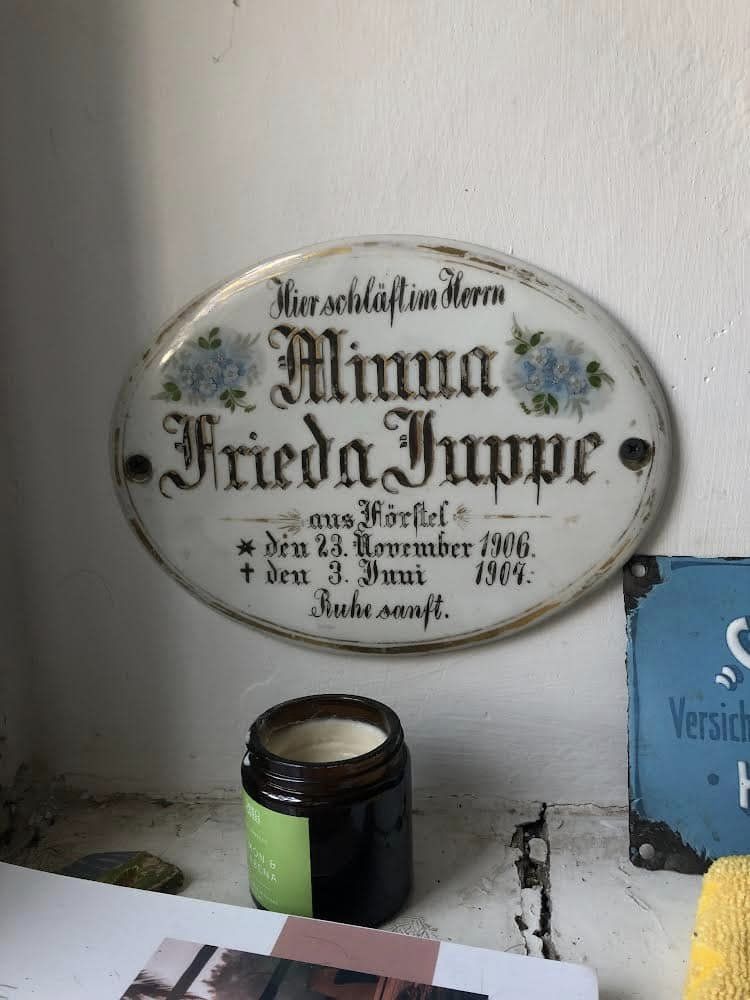
The gravestone of Minna Frieda Juppe / Photo: private archive of Ania, the owner of Domek pod Orzechem in Gierczyn.
On the right: Minna Frieda Juppe’s birth certificate, on the left: Minna Frieda Juppe’s death certificate / Source: State Archives in Wrocław, Jelenia Góra branch

Entry from the 1940 address book with the name Gustav Juppe
On the right: Gustav Juppe’s will, on the left: Gustav Juppe’s signature / Source: State Archives in Wrocław, Jelenia Góra branch.
Deed of sale / Source: State Archives in Wrocław, Jelenia Góra branch.
Archival photos of Domek pod Orzechem / Photo: private archive of Ania, the owner of Domek pod Orzechem in Gierczyn.
At least we know a bit more about the kind spirit residing in Domek pod Orzechem, lending a hand to the hosts. Discover it for yourself and consider Gierczyn for a weekend retreat.
Domek pod Orzechem today / Photo: private archive of Ania, the owner of Domek pod Orzechem in Gierczyn.
Thank you to Ania from Domek pod Orzechem for sharing the photos.
Sources:
Końcowy raport składa się z kopi odnalezionych dokumentów, tłumaczeń, zdjęć oraz podsumowania. Wyjaśniam pokrewieństwo odnalezionych osób, opisuję sprawdzone źródła i kontekst historyczny. Najczęściej poszukiwania dzielone są na parę etapów i opisuję możliwości kontynuacji.
Czasem konkretny dokument może zostać nie odnaleziony z różnych przyczyn – migracji do innych wiosek/miast w dalszych pokoleniach, ochrzczenia w innej parafii, lukach w księgach, zniszczeń dokumentów w pożarach lub w czasie wojen. Cena końcowa w takiej sytuacji nie ulega zmienia, ponieważ wysiłek włożony w poszukiwania jest taki sam bez względu na rezultat.
Raporty mogą się od siebie mniej lub bardziej różnić w zależności od miejsca, z którego rodzina pochodziła (np. dokumenty z zaboru pruskiego, austriackiego i rosyjskiego różnią się od siebie formą i treścią).
Na podstawie zebranych informacji (Twoich i moich) przygotuję plan i wycenę – jeśli ją zaakceptujesz, po otrzymaniu zaliczki rozpoczynam pracę i informuję o przewidywanym czasie ukończenia usługi. Standardowe poszukiwania trwają około 1 miesiąca, a o wszelkich zmianach będę informować Cię na bieżąco.
Na Twoje zapytanie odpiszę w ciągu 3 dni roboczych i jest to etap bezpłatny. Być może zadam parę dodatkowych pytań, dopytam o cele albo od razu przedstawię propozycję kolejnych kroków.
Warto pamiętać, że im więcej szczegółów podasz, tym więcej rzeczy mogę odkryć.
Podziel się ze mną:
I najważniejsze – jeśli masz niewiele informacji, zupełnie się tym nie martw, w takich sytuacjach także znajdę rozwiązanie.